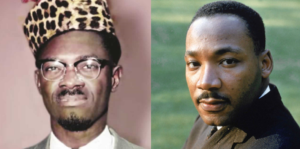
What did these two men mean for us, for Black people and the ongoing struggle for liberation? These Black freedom fighters fought for the same thing — a world free of white supremacy and racist colonial oppression, and a socialist restructuring of society. And it is for these reasons that King and Lumumba were assassinated, and by by those who were only interested in the status quo of white domination.
Described by Belgian author Ludo De Witte as “the most important assassination of the 20th century,” Lumumba was killed only months after Congolese independence from Belgium, after nearly a century of colonial rule. The brutal regime of King Leopold killed millions of people in the Congo, through a system of economic exploitation, the raping and pillaging of the people and their land. And the Western powers — including the U.S., which had an interest in the Congo – wanted to maintain control over the natural resources of the mineral-rich country.
Lumumba sought true political and economic independence, including control over the resources to improve the condition of Black people, and Pan-African independence. But the U.S. and Belgium would not have it, and Lumumba sought support from the Soviet Union, which is why both countries conspired to assassinate the leader.
In 1964, Malcolm X said “Lumumba [is] the greatest black man who ever walked the African continent. He didn’t fear anybody. He had those people so scared they had to kill him. They couldn’t buy him; they couldn’t frighten him; they couldn’t reach him.”
Dr. Martin Luther King, recipient of the Nobel Peace Prize in 1964, was known for his nonviolent movement against the racial segregation of Black people, and his campaigns against the structures of American oppression. Through his Southern Christian Leadership Conference, King led boycotts and marches against legal segregation and helped bring about the seminal civil rights legislation of the 1960s.
Far too often, the civil rights and human rights leader has been rebranded and recast as a “dreamer” who simply wanted Black and white children to sit next to each other. This watered-down, neutered and milquetoast King is a far cry from the real King, the one who spoke of unjust laws and the need to disobey them. Dr. King also railed against drum major behavior: “Do you know that a lot of the race problem grows out of the drum major instinct? A need that some people have to feel superior … and to feel that their white skin ordained them to be first,” he said.
More important, King had a radical worldview that is often conveniently forgotten. After all, he spoke of the need for America to “undergo a radical revolution of values,” arguing that “we must rapidly begin the shift from a ‘thing-oriented’ society to a ‘person-oriented’ society.” He added:
When machines and computers, profit motives and property rights are considered more important than people, the giant triplets of racism, materialism, and militarism are incapable of being conquered.
A critic of capitalism, King was a threat because he sought a radical economic restructuring of society. In addition, he connected the dots between racial oppression against Black people in the U.S., and the exploitation of Third World people through the Vietnam War. He called the U.S. “the greatest purveyor of violence in the world” and lost friends in the U.S. who insisted that he remain on the civil rights plantation and not veer into international affairs.
“Our national priorities are disastrously confused when we spend more than $30 billion a year upon a tragic, destructive war in Southeast Asia and cut back on the programs which deal with the most basic injustices of America itself,” he wrote.
Dr. King was a prime target of the FBI under J. Edgar Hoover, who described the Black leader as the “most notorious liar” in America. King was assassinated in Memphis, Tennessee while helping fight for the economic rights of striking sanitation workers. He had viewed his Poor People’s Campaign against poverty and unemployment as the next stage of the struggle.
King and Lumumba were freedom fighters on different continents, whose struggles linked the causes of Black people in Africa, the U.S. and everywhere. Their crystal-clear vision of a Black people free from oppression stood as a testament that we are all in this together with a common purpose and a common enemy. And that enemy neutralized those two and so many other leaders for Black liberation.


